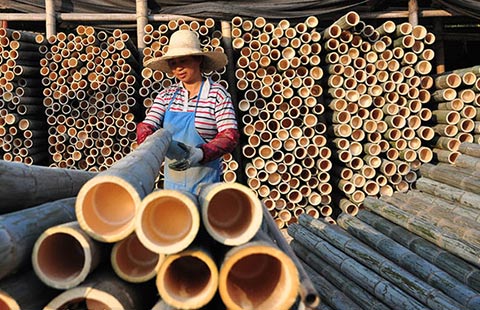China changes residential electricity pricing
(Xinhua) Updated: 2012-06-12 14:02BEIJING - China will begin introducing progressive electricity rates for residential use after revisions to the original plan, the country's top economic planner said Tuesday.
The new electricity pricing scheme is part of plans to improve price reforms for electricity, water, oil and natural gas amid increasing supply pressure of energy and resources in the country, the National Development and Reform Commission said in a statement on its website.
Similar to a progressive tax, the residential electricity rate increases as the electricity consumption base amount increases. All residents pay electricity bills according to the same rate no matter how much power they consume.
For example, Beijing has set three price brackets for residential electricity users and will keep the current electricity rate unchanged for residents consuming 240 kWh or less electricity a month. Families whose monthly electricity consumption falls between 241 kWh and 400 kWh will have to pay 50 yuan ($7.9) more for every 1,000 kWh of electricity, while those consuming more than 400 kWh of electricity a month will pay 300 yuan more for every 1,000 kWh of power.
The current electricity rate for Beijing households remains at 48.83 yuan for every 100 kWh of consumption.
According to the NDRC, or China's top economic planner and price regulator, the first-bracket pricing standard will cover about 80 percent of households across the country and those low-income groups will be given a certain amount of free electricity consumption.
"It's a difficult issue to balance the interests of the public, electricity producers and the society when carrying out price reforms," the NDRC statement said, adding the commission handled the reforms in a fair and open way.
"The government's price policies will give more attention to address concerns from the public about people's livelihoods and maintain a balance between different interests," it said.
Prices of electricity, oil and gas are currently controlled by the NDRC, which adjust prices according to changes in international markets.
The NDRC has warned China will face power shortages and development imbalance between regions during its process of industrialization and urbanization.
China has been pushing for reforms in its pricing of resource products and energy as part of its efforts to better reflect market demand and save energy as power shortages are reported almost every summer.
One cause of the power shortages is the imbalance between coal demand and supply, as coal-fired power generators cannot afford to buy expensive coal and to provide electricity at the government-fixed price.
- Western Chinese province revisits Silk Road for growth
- Tesla teams with property developer to expand charging poles
- Chinese investment firms set up fund to support 'Internet Plus'
- China housing market regains momentum
- Fewer Chinese companies go public in July
- China's e-commerce trade over 16t yuan in 2014
- Vanke to enter home decor market
- China on alert for program-controlled stock trading

















